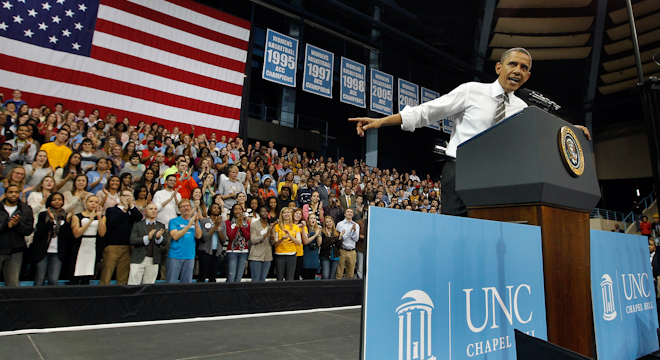In a reprise of the winter fight over the payroll tax cut, Republicans are now reluctantly agreeing to support something that just weeks ago they strongly opposed: preventing student loan interest rates from doubling later this year.
It’s an issue Republicans fear will fire up the youth vote — a key Democratic constituency — and in an effort to keep that bloc from flocking back to President Obama in November they’re attempting to bigfoot Democrats on their own issue.
But the Republicans’ strategy threatens to tear at existing divisions within the party, and exposes them once again to political repercussions over their unwillingness to finance any popular policies by raising taxes on wealthy people.
Democrats want to close a loophole that allows certain wealthy professionals to protect big chunks of their income from the Medicare payroll tax. Payroll taxes are typically used as revenue streams for funding existing entitlement programs. Democrats want, essentially, to create a new stream and then repurpose the revenue to cover the cost of keeping student loan interest rates low.
Just as in payroll tax cut debacle, though, Republicans have moved the fight to the familiar grounds of how to pay for extending the current low rates, and are accusing Democrats of raiding a popular entitlement program to pay for new spending.
“Democrats want to pay for it by raiding Social Security and Medicare, and by making it even harder for small businesses to hire,” claimed Senate Minority Leader Mitch McConnell on the Senate floor Wednesday.
Are Democrats really proposing to drain Social Security and Medicare trust funds to finance cheap student loans?
Of course not.
One Senate GOP aide even acknowledged that the Dem plan won’t eat in to Medicare’s existing sources of revenue. But the same aide also argued, more subtly, that with Medicare’s finances in trouble, it makes no sense to siphon off new revenue slated for the Medicare trust fund to finance new spending.
The bickering over Medicare is a sideshow to the political fight. Democrats are proposing a policy they know Republicans will reject, and believe it will help them advance their case to the public that the GOP would rather protect wealthy people from paying higher taxes than shield students from a $1,000 spike in fees.
Republicans appear wise to the dangers. Despite the fact that many conservative Republicans want the federal government out of the student loan business altogether, House Speaker John Boehner has scheduled a Friday vote on legislation to avoid the student loan interest rate cliff, and proposes paying for it by repealing the Prevention and Public Health fund created by the Affordable Care Act — something Republicans have labeled a “slush fund.”
Democrats will reject that financing scheme, leaving both parties to face familiar conundrums.
Boehner will have to pass the legislation with his own members — which means asking his intransigent conservative members to fall in line. This has created huge headaches for GOP leadership in the past — but they’ve succeeded at times like this when Democrats have them backed into a corner.
If they pass it, and Senate Republicans filibuster the Democrats’ bill, House Republicans can try to jam Democrats with their partisan pay-for. Republicans have tried this before — but have had a hard time persuading the public that they’re not the source of congressional gridlock.
Senior administration officials are familiar with this dynamic, which reared its head during the winter payroll tax cut fight. It’s why Obama’s in the midst of a media blitz on the issue this week. If they’re right, Republicans will have to give ground, and either agree to more amenable financing schemes, or to add the cost of keeping student loans cheap to the budget deficit. Otherwise we’re headed for a big, election-year standoff in the weeks ahead, with the youth vote — a key faction of Obama’s voting base — paying close attention.










